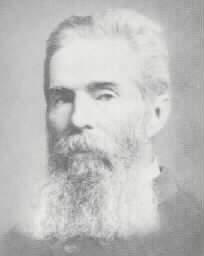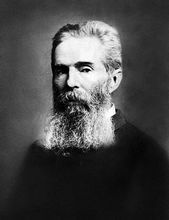
Nationality: American
 赫爾曼· 梅爾維爾
赫爾曼· 梅爾維爾 赫爾曼· 梅爾維爾
赫爾曼· 梅爾維爾Place of Birth: New York City
Death Date: September 28, 1891
Place of Death: New York City
Genre(s): FICTION; SHORT STORIES; NOVELS; POETRY; ADVENTURE FICTION
Herman Melville, who died almost forgotten although he had once been a popular author and had left behind ten notable books of prose fiction and four of verse, has gathered increasing fame, especially for his metaphysical whaling novel, Moby-Dick. Like much of his writing, Moby-Dick originates in his experiences as a common sailor and in the complex reactions of his lively mind to ageless spiritual questions and to the ebullient society of his time. One of the few American books recognized as a world classic, it has overshadowed the considerable achievement of his other work, which is diverse and experimental and, though sometimes flawed, often shows remarkable control. His narratives of adventure in the South Seas are small masterworks of the genre. His short tales, "Bartleby" and "Benito Cereno," are carefully crafted and profoundly sensitive critiques of his own age that emerge as fables applicable to a later day. His paired sketch, "The Paradise of Bachelors and the Tartarus of Maids," combines cunning social criticism and psychological insight. He wrote perhaps a dozen poems of distinction, most of them brief and the outgrowth of his travels or his musings on the events of the Civil War. It can be argued that his last published prose work, The Confidence-Man, is the first modern American novel. Without doubt, it is an uncanny tour de force.
Because so much of it appears in his writing, the study of Melville's life has more than ordinary interest. Early and conspicuously autobiographical novels like Omoo he prefaces with an assertion that "he has merely described what he has seen." White-Jacket, he states, is an account of his "man-of-war experiences and observations." But more and more, as he became landlocked, his books grew to be inside narratives, the voyages of a mental traveler. So, in addition to the obvious biographical facts, a more difficult study, that of Melville's mind and spirit, should be pursued, and it should embrace not only his psychological and intellectual history but his responses, frequently deviant and always ambivalent, to nineteenth-century American culture.
Melville's father, Allan, an "importer of French Goods and Commission Merchant" who traveled abroad, was a member of a substantial if colorful Boston family. His grandfather, Major Thomas Melvill, was a venerable survivor of the Boston Tea Party whose refusal to change the style of his clothing or his manners to fit the times made him an emblematic figure in Oliver Wendell Holmes's poem "The Last Leaf." Herman would visit him in Boston and his father would turn to him in times of financial need, which were all too frequent. The other side of the family was Hudson Valley Dutch. His maternal grandfather, General Peter Gansevoort, a hero of the Saratoga campaign, was an imposing subject in his goldlaced uniform for the painter Gilbert Stuart. The portrait would appear in Melville's later novel, Pierre, for Melville wrote out of his familial as well as his nautical background. Like the titular character in Pierre , Melville found satisfaction in his "double revolutionary descent."
Allan Melvill's family lived comfortably in New York. He had his children baptized in the Dutch Reformed Church and sent his sons to the New York Male School where they could get something more than a common education. But he overextended himself and was emotionally unstable. His attempt to recoup in 1830 by moving his family to Albany, New York, and going into the fur business ended in disastrous failure. He died in 1832 of a sudden illness that included mental collapse, and left his widow in genteel poverty, largely dependent upon her well-off kin.
For young Melville his father's death brought an end to what seems, outwardly at least, to have been a stable and unremarkable childhood. At twelve he was forced to leave Albany Academy, where he had been a satisfactory student, to take a job as a bank clerk. henceforth he would educate himself, and for some time to come he would drift from one thing to another. He clerked in the family fur and cap business now run by his older brother Gansevoort, worked on his Uncle Thomas Melvill's farm at Pittsfield, Massachusetts, taught irregularly in various district schools, and in 1839 he made "his first voyage"--to quote the subtitle of Redburn , an initiation story based on this experience--as a member of the crew of the merchant ship St. Lawrence, bound for Liverpool with a cargo of cotton. A decade later, when he wrote about this first voyage, he had his sailor-boy narrator think of himself as "a sort of Ishmael," a drifter and fatherless.
He returned to try his fortune in the West. His Uncle Thomas Melvill had moved to Galena, Illinois. With a friend, Eli Fly, Melville left Albany, following the Erie Canal to Buffalo, where he took a steamer. In the end he saw the prairies and the western wilderness and visited the headwaters of the Mississippi, the spectacular Falls of St. Anthony, but he found that his uncle could not secure his future, for there was a business recession. So he set out for home by Mississippi riverboat, with stops at St. Louis and Cairo. Melville's life on the Mississippi would be put to literary use in The Confidence-Man, but for the moment it appeared to serve no purpose.
By the fall of 1840 he was back in New York but still unsettled. If going west had proved bootless, there was another possibility open to venturesome young men: he could go to sea. Other members of his family had sought nautical careers, and besides, he was fresh from reading Richard Henry Dana , Jr.'s, Two Years Before the Mast. The words he put into Ishmael's mouth at the beginning of Moby-Dick fit his own case: "having little or no money in my purse, and nothing in particular to interest me on shore, I thought I would sail about a little and see the watery part of the world." In December 1840 he signed articles to serve as an ordinary seaman on a new whaling ship, the Acushnet, Valentine Pease, master, of Fairhaven, Massachusetts. On the crew list he is described as "Age 21 Height 5 feet 9-1/2 inches Complexion dark Hair brown." The Acushnet cleared the port of New Bedford on 3 January to cruise for whales in the Pacific. Such voyages usually lasted three or four years.
On 3 October 1844, the frigate United States anchored at the Boston Navy Yard and its captain wrote for permission to discharge the crew. Among them was Herman Melville, age twenty-five. Word of his arrival soon reached the family, probably by way of his cousin, Lieutenant Guert Gansevoort, then stationed on a naval receiving ship in Boston harbor following his difficult duties in connection with the alleged mutiny aboard the brig Somers. Melville was paid off with the rest of the crew on 14 October. He saw his brother, Gansevoort, by now a New York lawyer and flashy political orator, who instructed him to shave and clean himself up before proceeding to Albany and the nearby village of Lansingburgh to receive the family welcome. He found there an admiring audience for his sailor yarns and was encouraged to write them down. That winter he began a series of personal narratives of his wanderings in Polynesia and his life on whaling ships, in the merchant marine, and in the United States Navy. In the summer of 1851, at work on Moby-Dick, he would reminisce to Hawthorne: "Until I was twenty-five, I had no development at all. From my twenty-fifth year I date my life. Three weeks have scarcely passed, at any time between then + now, that I have not unfolded within myself."
寫作特點
觀麥爾維爾的創作實踐,他的作品可以分成三大類:第一類是他早期的和一些不太知名的小說。這些作品大都是依據某些史實和作者本人的海上經歷而創作的,其中也包括寓言性很強的《瑪迪》。第二類是《白鯨》,這是作者的登峰造極之作。第三類是他的後期作品。這一時期的作品比他的早期作品略為知名一些,其中有不少堪稱大手筆的短篇和詩作,如他的《貝尼托·塞萊諾》、《書記員巴特爾比》、《比利·巴德》和詩集《克拉萊爾》、《戰事集》等就是這一時期的典型之作。[2]麥爾維爾筆下的這些人物,大都是一些善於思考的人,力圖從哲學思考中找到某種精神安慰。小說差不多寫了一半,麥爾維爾才漸漸透露雷德伯恩的身份。他是一位充滿民族自豪感的人,對自己的祖先是美國人而感到驕傲:“我們的鮮血就像亞馬遜河的急流奔騰不息,直到匯成一體。我們不是一個民族,而更像一個世界⋯⋯我們是所有時代的繼承人。我們和所有民族的人一起分享繼承權。在這個西方國度,所有族群和人民正組成一個聯合的整體,未來將使所有分離的亞當的後代重返伊甸家園“。但不管怎樣,《雷德伯恩》中的人物形象還是比較豐滿的。只是從情節的發展來看,作品似有些拖沓,敘述不夠簡練,因此還算不上作者本人聲稱的所謂“大雜燴“這一類作品。應該說這部小說主題突出,意象也比較獨特。作者還圍繞屬性問題進行了一番探討。當雷德伯恩為了使勢利的船長對自己有個好印象時就不得不裝出富人的樣子。他那勉強能夠度日的微薄收人怎么能掩蓋住其實質上的貧困。為了不露馬腳,雷德伯恩只好偽裝自己。他處處小心翼翼,惟恐被人發現。但無論雷德伯恩怎樣小合,他都無法掩蓋兜里沒錢的事實。無奈之下,他只好發出悲槍的感慨:“窮人幹啥都窮,想裝富也裝不起來。“’“暴露了真相的雷德伯恩只好乾船上最低級的活。[2]
在《巴特爾比:一名抄寫員》梅爾維爾通過對巴特爾比無聲抗爭的演繹,有力地回應了超驗主義過於樂觀的世界觀,也表達了自己不同的看法。超驗主義者認為“上帝是仁慈的,自然界是上帝的一種化身和象徵,也是上帝仁慈的體現;人的靈魂具有神性,所以,人的本性也是善良的,人同自然是統一的。”而在梅爾維爾看來,沒有什麼事物是絕對美好的或絕對罪惡的。愛默生所宣揚的超驗主義樂觀精神對泱泱社會中的個人的發展並不能帶來真正意義上的幫助。個人的力量是渺小的,根本無力與社會進行抗爭。愛默生只是在給我們描述一種人類生活的理想狀態,永遠無法企及,只是空中樓閣,令人憧憬而無法到達。[2]
此外,麥爾維爾還深受《聖經》故事的影響。不僅《白鯨》中的許多人物的名字來源於《聖經》,而且他還受到《聖經》中純樸生態觀點的影響。在《聖經》中,儘管自然是上帝用於懲罰人類的工具,人類在伊甸園之外要想生存下來,必須得克服惡劣的自然環境,但這並不意味著人類要想生存下來就必須得征服和改造自然。事實上,《聖經》要求人類小心地控制自然,而不是肆無忌憚地去征服它。上帝在給與人類統治地球的權利之外,還要求人類必須保護和哺育自然。
人物思想
雖然梅爾維爾算不上一個政治家,但他對政治天生有一種敏感。他羨慕美國的新生,但對美國不斷向外進行領土擴張持有異議。只要對美國歷史稍有了解便不難發現,美國政府在19世紀積極推行“天命說“(ManlifestDestiny),當時的美國民眾都有一種矛盾的心理,一方面為自己國家的強盛感到自豪,進而升起一種強烈的自我獨立意識;另一方面為自己的政府不斷卷人海外戰爭、人侵土著居民而感到內疚。青年時代的梅爾維爾自然也不例外。與所有的美國青年一樣,梅爾維爾同樣為美國的新生而歡呼。由於深受美國超驗主義思想的影響,尤其是受到愛默生的“自立”(Self一reliance)思想的感染,梅爾維爾一向主張自立。他曾慷慨激昂地寫道:“我們不需要美國版的哥爾斯密斯,不!我們也不需要美國版的米爾頓⋯⋯讓我們拋棄這個助長在文學上對英國阿談謅媚的發酵劑⋯⋯讓我們大膽地譴責所有的模仿⋯⋯“‘但他也清楚地認識到,美國這個新興的民族有著許多弊端。在他看來,美國政府過於狂妄,甚至野蠻,打著“天命說“的旗號四處擴張。梅爾維爾親眼目睹了這種擴張所帶來的惡果。美國政治上卷人了南太平洋爭端,與其它歐洲列強共同參與侵略和壓迫土著島民。對此,梅爾維爾極為不滿,從中可以看到梅爾維爾思想中的兩重性因素。他既對歐美殖民主義不滿,同情土著島民,又津津樂道於殖民者的強悍、能幹,貶責土著人。這也顯示了他思想的局限性。不能否認,梅爾維爾主要是社會的叛逆者,他的作品無不閃爍著批判的火花,直接針砭美國政治。但他也或多或少地參與了美國殖民文化的建構。梅爾維爾對主流文化的批判畢竟還是留有餘地的,其中也包含了作者對主流文化的某種認同。[2]赫爾曼·梅爾維爾,相信邪惡的普遍性,懷疑超驗主義的樂觀主義理論,對社會進步持悲觀態度,他給美國文學注入了悲劇色彩。其代表作《巴特爾比:一名抄寫員》體現了梅爾維爾作品對人性有敏銳的觀察和深刻的批判,通過對巴特爾比無聲抗爭的演繹,有力地回應了超驗主義過於樂觀的世界觀。通過分析這部作品與超驗主義之間的關係,闡釋梅爾維爾對其時美國社會所宣揚的超驗主義一種深刻批判,個人根本無力與社會相抗爭。

